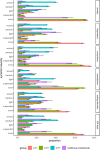Depression and anxiety in healthcare professionals during the COVID-19 pandemic
- PMID: 33557984
- PMCID: PMC7900665
- DOI: 10.1017/S0950268821000303
Depression and anxiety in healthcare professionals during the COVID-19 pandemic
Abstract
Healthcare staff have been at the centre of the fight against the COVID-19 pandemic, facing diverse work-related stressors. Building upon studies from various countries, we aimed to investigate (1) the prevalence of various work-related stressors among healthcare professionals in Germany specific to the COVID-19 pandemic, (2) the psychological effects of these stressors in terms of clinical symptoms, and (3) the healthcare professionals' help-seeking behaviour. To this end, N = 300 healthcare professionals completed an online survey including the ICD-10 Symptom Rating checklist (ISR), event-sampling questions on pandemic-related stressors and self-formulated questions on help-seeking behaviour. Participants were recruited between 22 May and 22 July 2020. Findings were analysed using t tests, regressions and comparisons to large clinical and non-clinical samples assessed before and during the pandemic. Results show that healthcare professionals were most affected by protective measures at their workplace and changes in work procedures. Psychological symptoms, particularly anxiety and depression, were significantly more severe than in a non-clinical pre-pandemic sample and in the general population during the pandemic. At the same time, most professionals indicated that they would not seek help for psychological concerns. These findings indicate that healthcare employers need to pay greater attention to the mental health of their staff.
Keywords: COVID-19; help-seeking behaviour; mental health; nursing staff; occupational stress; pandemics.
Figures
References
-
- Krammer S et al. (2020) Adjustment disorder, depression, stress symptoms, Corona related anxieties and coping strategies during the Corona pandemic (COVID-19) in Swiss medical staff. PPmP – Psychotherapie Psychosomatik Medizinische Psychologie 70, 272–282. - PubMed
MeSH terms
LinkOut - more resources
Full Text Sources
Other Literature Sources
Medical


